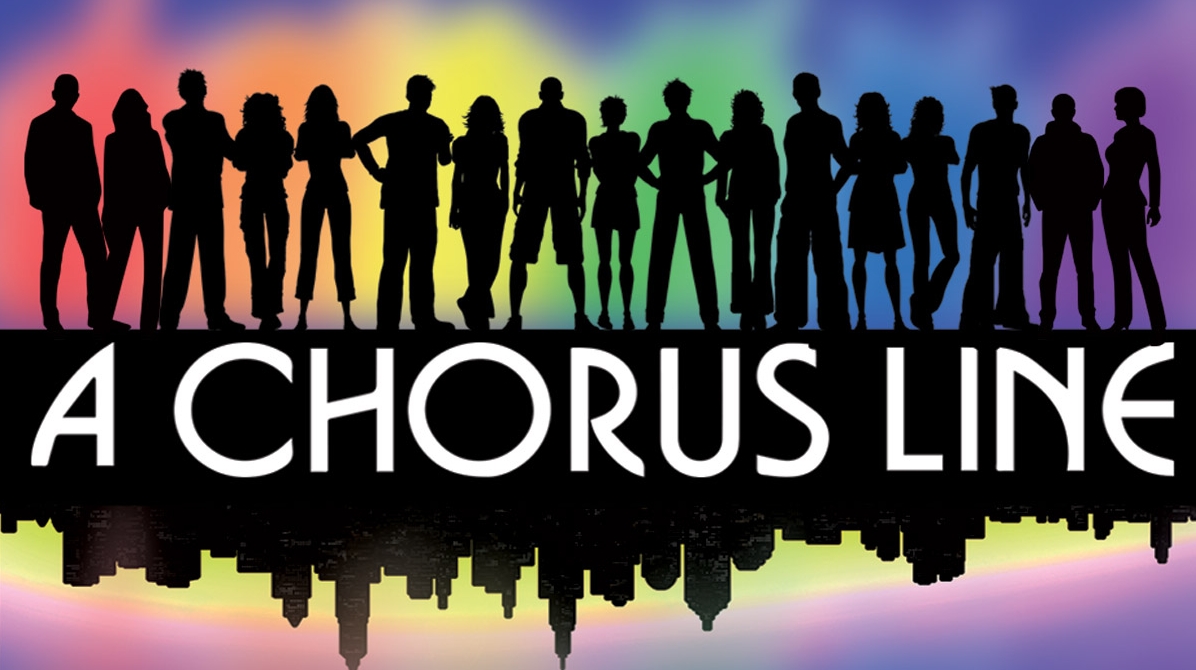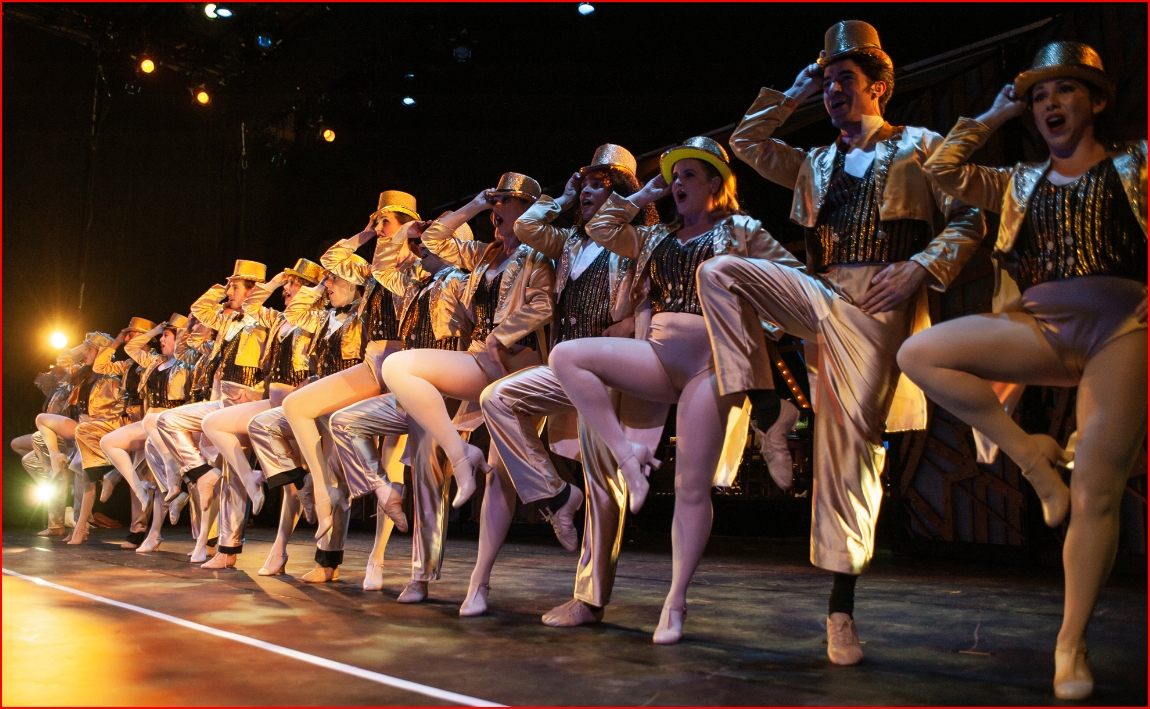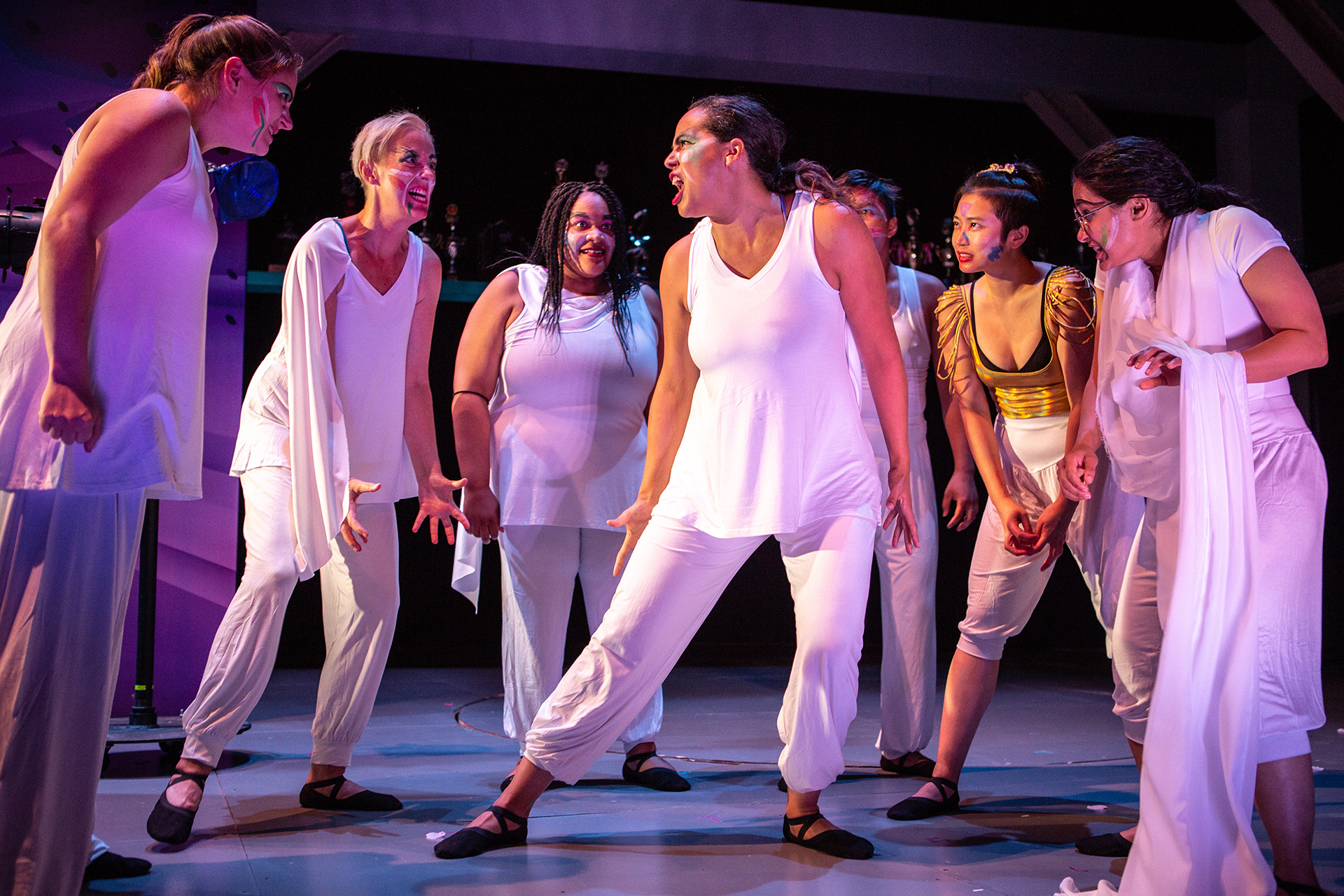 By George Maguire and Barry Willis
By George Maguire and Barry Willis
Early each summer, San Franciso Playhouse launches a classic musical that runs well into September—a genius strategy leveraging Union Square tourist traffic. This year’s offering is a brilliant production of A Chorus Line, directed by Bill English and choreographed by Nicole Helfer.
Background: In 1975, word on the street in New York City was “get to the Public Theatre and see the workshop of a new musical called A Chorus Line!” The show opened to standing-room-only on April 14, closed on July 13, and opened 12 days later on Broadway at the Shubert Theater, becoming (until Cats) the longest-running musical in Broadway history. It’s hard to imagine that A Chorus Line appeared the same year as Fosse’s Chicago and Sondheim’s Pacific Overtures. A Chorus Line swept the Tony Awards, leaving Chicago empty-handed until the revival put together by Ann Reinking.
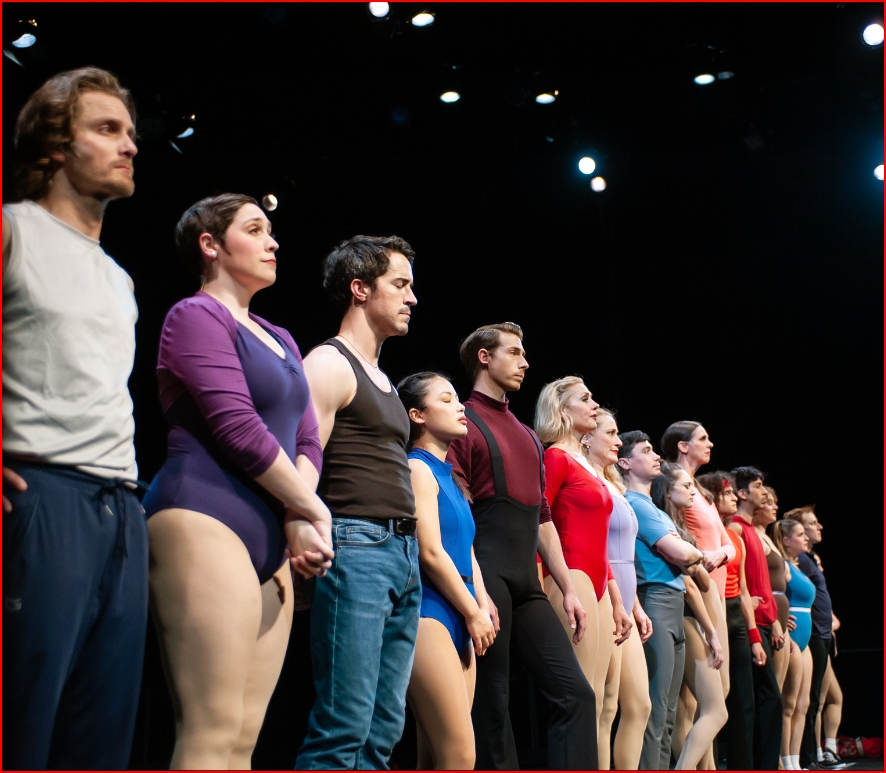
Based on Michael Bennett’s conversations with Broadway dancers, the story centers on their careers, hopes, dreams, frustrations, and possible longevity during a wildly vacillating time for Broadway musicals. At these initial meetings, Bennet knew he had something remarkable to tell. The team of writers Nicholas Dante and James Kirkwood, lyricist Ed Kleban, composer Marvin Hamlisch, and co-choreographer Bob Avian yielded one of the most revolutionary musicals of all time, a conceptual breakthrough when it first appeared.
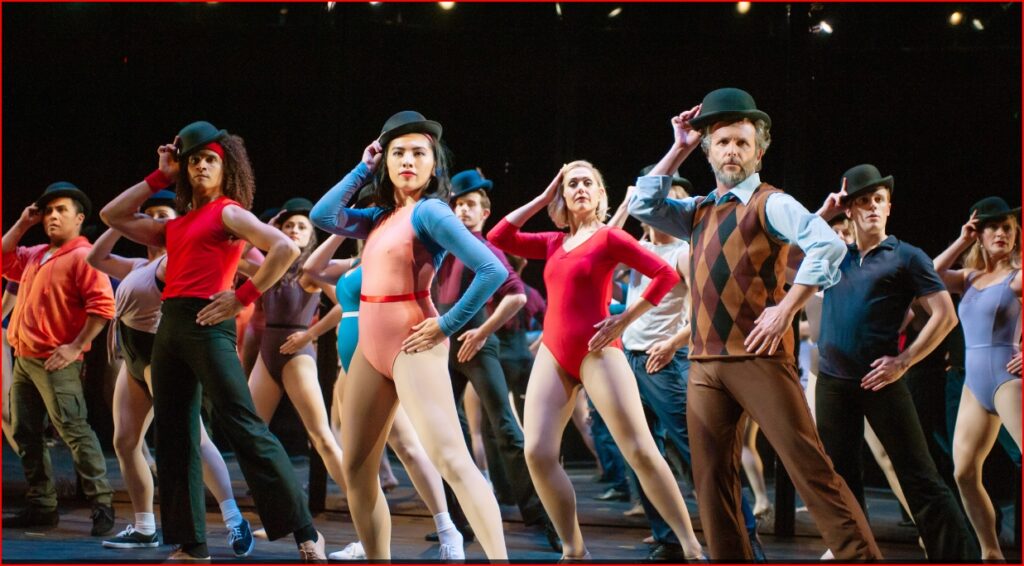
A Chorus Line conveys multiple stories about a corps of dancers seeking spots in a touring production. A couple of them are so young that they have yet to land their first serious gigs. At the other end of the spectrum are veterans feeling the inevitable pressures of age. In between are those with personal issues that could affect their careers — the responsibilities of parenthood, for example, or long-running guilt over being gay (this was the early ‘70s), or a drug habit, or a tone-deaf singing voice. Anything that might derail the touring production for which they are auditioning is cause for anxiety for them and the show’s director. There are ongoing and sometimes overly broad hints about fleeting friendships and petty jealousies among the dancers.
. . . A Chorus Line is every actor’s story, whether professional or community theater. “I Hope I Get It” . . .
Overseeing them all is a stern but not unsympathetic taskmaster named Zach (Keith Pinto), choreographer of the show-to-be. Zach talks to them in turn as he puts them through their paces, sometimes barking like a Marine Corps drill instructor and at other times almost whispering like a trusted friend.
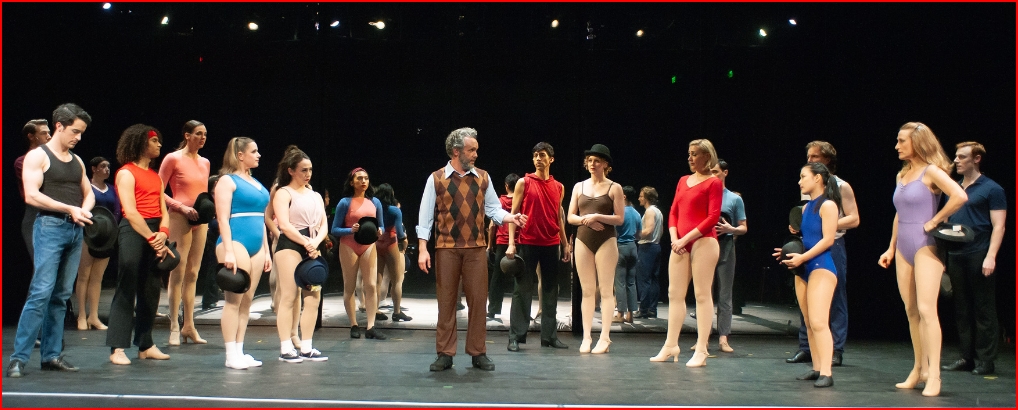
Zach came up through the ranks and understands their plight, but he also has a high-pressure job to do. Pinto manages this conflict like a high-wire artist, in a riveting performance.
GM: Wasn’t it great to see the SF Playhouse stage filled with some of the finest musical theater talent in SF?
BW: Absolutely. We are lucky to live in such a talent-rich part of the world—talent across all the arts, not merely theater. This production features some of the Bay Area’s best.
GM: Bill English’s direction really highlights the uniqueness in each role as their stories unfold, and Nicole Helfer’s choreography hits a balance of distinction for each. Her ensemble numbers are remarkable.
BW: Nicole is a wonderful choreographer and an excellent director. She filled both duties exceptionally well with her fine production of She Loves Me at RVP recently. This Chorus Line is the first time I can recall seeing her onstage.
I thought she brought a superb blend of self-doubt, vulnerability, determination, and mastery of the craft to the role of Cassie, the show-to-be’s potential lead dancer, Zach’s former girlfriend, and an almost-over-the-hill veteran who hopes to land just one more glorious role before resigning herself to the post-career Siberia of teaching. Nicole’s solo “The Music and the Mirror” is marvelous.
GM: I loved the surprises of newer emerging talents like Chachi Delgado’s as Richie in “Gimme The Ball” and Tony Conaty as Mike in “I Can Do That.”
BW: They’re both great performers. Conaty is amazingly dynamic, but Delgado is in a league of his own in this production—the epitome of innate athleticism, effortless grace, and deep confidence.
GM: Great to see the husband and wife team of Keith Pinto and Alison Ewing perform so well as Zach and Sheila.
BW: Absolutely. Their real-world relationship in some ways reflects a couple of the show’s secondary themes.
GM: Chorus Line never needs a set as such—the tall mirrors at the back of the stage evoke the 52nd & Broadway dance studio where the original actually took place. Michael Oesch’s lighting design brought us focus, and his finale lights are stunning!
BW: Michael made incalculable contributions to the success of this production. During the post-show meet-and-greet he mentioned having basically lived at the Playhouse for the last two weeks before opening.
GM: A Chorus Line delves into the personal and professional torment that is the life of all artists. 1975 was my time in NYC, Barry. I stopped auditioning for Broadway choruses when I was at the very end of the final ten for Shenandoah. Choreographer Bob Tucker asked me (like Zach does) in front of everyone “Why aren’t you taking dance classes?”
I had not taken dance classes to sharpen my skills. I mumbled some lame excuse, walked out with my head down—crying on Broadway!—then said to myself, “Well, maybe I can do Shakespeare!” The rest, dear hearts, is history.
A Chorus Line is among the greatest productions ever about the lives of desperate artists, willing to make almost any sacrifice for their moment under the bright lights. It’s simultaneously personal, painful, and exhilarating—and Dave Dobrusky’s backstage band is terrific! This SF Playhouse production is a must-see event.
-30-
 ASR Contributing Writer George Maguire is a San Francisco-based actor/director and is Professor Emeritus of Solano College Theatre. He is a voting member of the SF Bay Area Theatre Critics Circle. Contact: gmaguire1204@yahoo.com
ASR Contributing Writer George Maguire is a San Francisco-based actor/director and is Professor Emeritus of Solano College Theatre. He is a voting member of the SF Bay Area Theatre Critics Circle. Contact: gmaguire1204@yahoo.com
 ASR NorCal Executive Editor Barry Willis is a member of the American Theatre Critics Association and president of the SF Bay Area Theatre Critics Circle. Contact: barry.m.willis@gmail.com
ASR NorCal Executive Editor Barry Willis is a member of the American Theatre Critics Association and president of the SF Bay Area Theatre Critics Circle. Contact: barry.m.willis@gmail.com
| Production | A Chorus Line |
|---|---|
| Written by | James Kirkwood and Nicholas Dante/music by Marvin Hamlisch/lyrics by Edward Kleban |
| Directed by | Bill English |
| Producing Company | San Francisco Playhouse |
| Production Dates | Thru Sept 9th |
| Production Address | SF Playhouse 450 Post Street San Francisco, CA |
| Website | www.sfplayhouse.org |
| Telephone | (415) 677-9596 |
| Tickets | $15 - $100 |
| Reviewer Score | Max in each category is 5/5 |
| Overall | 4.5/5 |
| Performance | 4.5/5 |
| Script | 5.0/5 |
| Stagecraft | 4.0/5 |
| Aisle Seat Review Pick? | YES! |

